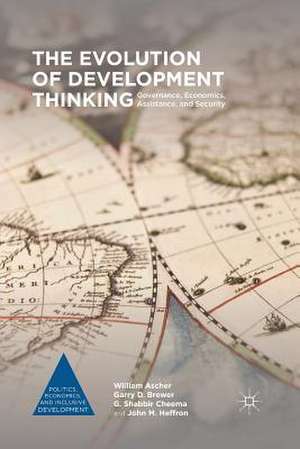The Evolution of Development Thinking: Governance, Economics, Assistance, and Security: Politics, Economics, and Inclusive Development
Autor William Ascher, Garry D. Brewer, G. Shabbir Cheema, John M. Heffronen Limba Engleză Paperback – 13 feb 2018
| Toate formatele și edițiile | Preț | Express |
|---|---|---|
| Paperback (1) | 421.72 lei 6-8 săpt. | |
| Palgrave Macmillan US – 13 feb 2018 | 421.72 lei 6-8 săpt. | |
| Hardback (1) | 590.63 lei 6-8 săpt. | |
| Palgrave Macmillan US – 5 ian 2016 | 590.63 lei 6-8 săpt. |
Preț: 421.72 lei
Nou
Puncte Express: 633
Preț estimativ în valută:
80.70€ • 84.47$ • 67.16£
80.70€ • 84.47$ • 67.16£
Carte tipărită la comandă
Livrare economică 01-15 aprilie
Preluare comenzi: 021 569.72.76
Specificații
ISBN-13: 9781349575398
ISBN-10: 1349575399
Pagini: 287
Ilustrații: XIII, 287 p.
Dimensiuni: 155 x 235 mm
Greutate: 0.43 kg
Ediția:1st ed. 2016
Editura: Palgrave Macmillan US
Colecția Palgrave Macmillan
Seria Politics, Economics, and Inclusive Development
Locul publicării:New York, United States
ISBN-10: 1349575399
Pagini: 287
Ilustrații: XIII, 287 p.
Dimensiuni: 155 x 235 mm
Greutate: 0.43 kg
Ediția:1st ed. 2016
Editura: Palgrave Macmillan US
Colecția Palgrave Macmillan
Seria Politics, Economics, and Inclusive Development
Locul publicării:New York, United States
Cuprins
1. Introduction
2. Evolution of Economic Development Theories and Doctrines
3. Economic Policy Practice
4. Evolution of Governance and Development Administration Theory
5. Evolution of Governance and Development Administration Practice
6. Evolving Roles of Non-Governmental Organizations
7. The Evolution of Foreign Assistance Theories and Doctrines
8. International Development in the American Grain: From Point Four to the Present
9. Evolving Roles of the Military
10. Complementarity of Security and Development Doctrines: Historical Cases and Aftermaths
11. Conclusion: Linkages and Challenges
References
2. Evolution of Economic Development Theories and Doctrines
3. Economic Policy Practice
4. Evolution of Governance and Development Administration Theory
5. Evolution of Governance and Development Administration Practice
6. Evolving Roles of Non-Governmental Organizations
7. The Evolution of Foreign Assistance Theories and Doctrines
8. International Development in the American Grain: From Point Four to the Present
9. Evolving Roles of the Military
10. Complementarity of Security and Development Doctrines: Historical Cases and Aftermaths
11. Conclusion: Linkages and Challenges
References
Notă biografică
The authors have extensive research and leadership experience in academia, international organizations, and non-governmental organizations; covering the fields of public administration, political science, economic development, education, security studies, social services, education, natural resources, and the environment.
Textul de pe ultima copertă
This landmark book offers a comprehensive analysis of how development approaches have evolved since World War II, examining and also evaluating the succession of theories, doctrines, and practices that have been formulated and applied in the Third World and beyond. Covering all developing regions, the book offers an integrated approach for considering the entwined aspects of development: governance, economics, foreign assistance, civil society, and the military. With reference to carefully chosen case studies, the authors offer distinctive explanations for why development approaches fall short and systematically relate the evolution of development thinking to current challenges, identifying the strengths and weaknesses of key institutions and the clashes of institutional interests that have distorted otherwise sound doctrines and negatively affected development practice. In identifying the dynamics that account for shortcomings in past development attempts, and recommending a betterintegration of doctrines across the entire range of inter-connected development fronts, the book points to how development practice may be improved to better advance human dignity.

























